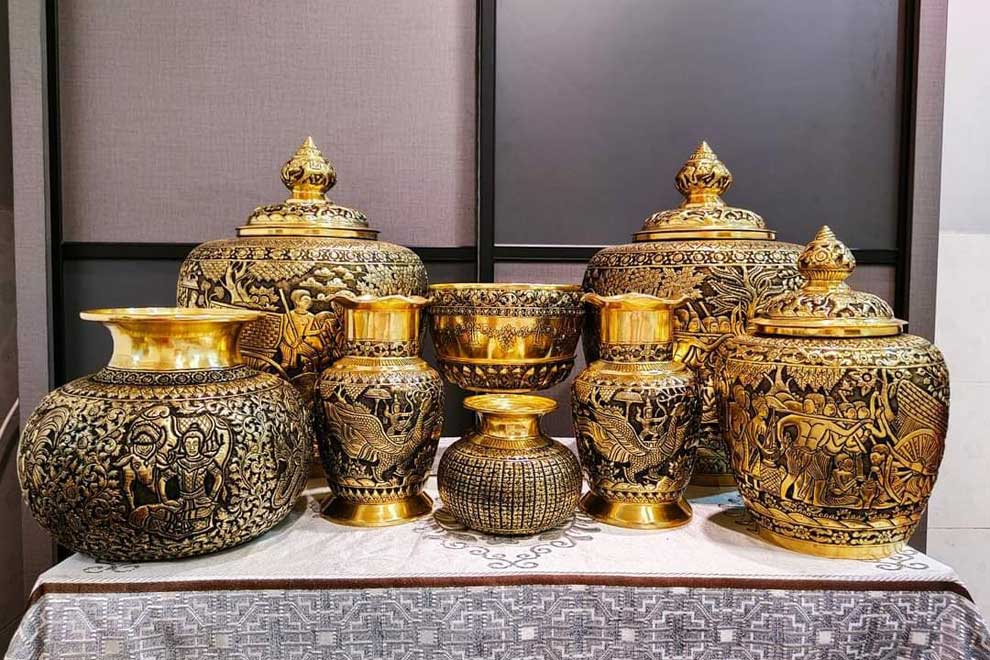
A women engraves a traditional pot in Kampong Chhnang province. Hong Menea
In a bid to support vulnerable families and empower young people, the government has launched a new initiative offering “ancestral vocational training”.
Led by the Ministry of Culture and Fine Arts, the programme kicks off this month and will encompass 13 communities in the capital and seven provinces.
This marks the first time the ministry has offered such courses, which aim to preserve traditional skills and provide valuable income opportunities.
Trainees can choose from 11 unique crafts, including khmok-smach (a traditional type of weaving used to make ceremonial face masks, as well as baskets), silver sculpting, leatherwork, silk weaving and traditional musical instrument construction.
Chhem Srey Neath, an IDPoor cardholder, is just one participant eager to embrace this opportunity. She has opted for the trom krama weaving course, drawn to its weaving and dyeing techniques and focus on eco-friendly practices. With limited skills beyond farming, she hopes the training will equip her to contribute to her family’s well-being.
“In the past, I had no vocational skills other than farming. But with this training, I believe I can learn something valuable and help support my family,” she tells The Post.
At 34 years old, the mother of three from Angkor Ban 7 village in Kampong Cham province’s Kang Meas district sees the training as a chance to build a future.
Certification earned, income unlocked
“Learning this skill is perfect for me. Being as I can’t work far from home, weaving would allow me to earn money for my family while preserving our Khmer ancestors’ culture,” Srey Neath explains.
Thuch Sophorn, head of the Angkor Ban Indigo Community, has been selected by the ministry to share her expertise as an instructor. With over 10 skilled weavers in her community, Sophorn’s selection highlights the existing knowledge base and her own proficiency in this traditional craft.
“Knowing that I already have this skill, the ministry chose me as a teacher. I’m excited to share my knowledge with local students, aged 20 to 40, who will soon begin the course,” Sophorn tells The Post.
“Traditional weaving has been a part of my village for generations. I learned it from my mother, just as she learned from hers. It’s been passed down through generations. The ministry’s focus on supporting poorer families with these skills is crucial, as it equips them to earn a living and improve their lives,” she says.
The training course will run on weekdays for one year, with six-hour classes split between morning and afternoon sessions. Graduates will receive ministry-issued certificates, and students holding IDPoor cards will receive a monthly stipend of 280,000 riel ($70). While non-cardholders won’t receive stipends, they will receive meal support during training.
“I applaud the ministry’s initiative with this ancestral training. It’s vital to share these skills with the next generation, ensuring our cultural heritage doesn’t fade away,” she says.
Building local expertise
Siyonn Sophearith, director-general of the ministry’s General Department of Cultural Technics, tells The Post that the ministry has set a maximum number of students at 300 in the initial phase, with 15 people per skill or course for all 11 skills, each lasting one year.
Regarding locations and teachers, the ministry opted to select communities with suitable accommodation for teaching, where learners also reside.
Training courses will be available in Phnom Penh, as well as Kandal, Takeo, Kampong Speu, Kampong Chhnang, Kampong Cham, Siem Reap and Ratanakkiri provinces.
He explains that the ministry established these training courses in response to former Prime Minister Hun Sen’s urging to provide training to poor and vulnerable individuals, particularly people lacking specific skills to sustain themselves and their families.
Hun Sen approved an initial vocational training programme for 30,000 to 60,000 underprivileged youth, representing 2-4 per cent of the target 1.5 million. Sophearith says the programme is currently in its pilot phase.
“We aim to enhance existing skills and knowledge within communities, building on where professionals already exist. With government support, we’ll expand this by offering training to both teachers and students. Funding exists for those with equity cards, indicating financial hardship, and vulnerable families possessing a recognised card,” he says.
The ministry initially focused on training teachers in pedagogy, he says, as traditionally skilled individuals often lack formal teaching experience.
Empowering communities
Sophearith adds that the ministry has successfully collaborated with the trainers to create lessons – a skill many had never developed before. While traditional skills abound, vocational training allows graduates to harness those talents professionally for improved livelihood.
“We aim to inspire interest in learning and revive these skills. For example, in Ratanakkiri province, pottery-making had been abandoned for over a decade due to lack of sales. However, our ministry’s working group revitalised the practice and locals are now selling their wares successfully,” he says.
Ben Chharan, a potter and sculptor from Prey Doeum Thnoeung II village in Prey Veng province’s Sithor Kandal district, welcomes the ministry’s initiative to offer training.
The 20-year veteran of the craft believes that such programmes, if rolled out nationwide, will promote cultural preservation and provide free educational opportunities for disadvantaged youth.
“Students in these programmes receive a financial allowance every month. I’d willingly volunteer to teach young people in my province if the ministry needs additional instructors,” he said.





















